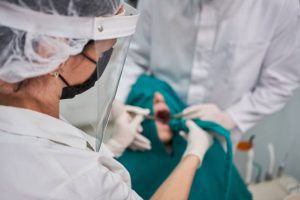| Oral Surgeon Key Stats | |
|---|---|
| Avg. Salary / year | $360,240 |
| Avg. Pay / hour | $173.19 |
| Education | 4+ Years |
| Job Outlook | 7% |
| Total Employed | 5,330 |
Oral Surgeons are professionals who are experienced professionals in the dentistry field.
These professionals are experienced in operating on patient mouths and jaws to help remedy a variety of dental problems needing surgery.
Individuals who want to become an Oral Surgeon will have to follow a similar path that dentists take in order to enter this profession.
Because Oral Surgeons treat and operate on their patients, they are required to study in the dental and medical field, gain several years of experience, and secure a license to practice oral surgery.
Go to Page Section:
Education Requirements to Become an Oral Surgeon
Individuals who want to become an Oral Surgeon will have to attain a bachelor’s degree, complete dental school and secure a license in order to enter this profession and practice on patients.
In all, it can take an individual more than 8 years of postsecondary training.
Individuals beginning their undergraduate degrees are not required to choose a specific major but are encouraged to study a science related field.
Competition to enter dental school is high therefore individuals who complete a bachelor’s in biology or microbiology will have better prospects in entering a dental school.
In addition, candidates will also stand out if their educational background includes coursework in: chemistry, mathematics, health, physics and biology.
Individuals who want to become an Oral Surgeon must take the entrance exam, called the Dental Admission Test to apply for dental school.
Individuals are encouraged to take this entrance exam during their junior year of college.
Individuals may visit the ADA to learn more information about the entrance exam and for preparation material.
Like medical school, a dentistry program requires an additional 4 years to complete.
Individuals enrolled in a dentistry program can expect a combination of classroom instruction, laboratory work and similar to medical schools, clinical experience treating patients under the instruction of a licensed dentist.
Typical coursework includes classroom instruction in:
- Anatomy
- Anesthesia
- Radiology
- Periodontology – the study of oral disease and health
Because oral surgery is a specialty under dentistry, individuals who want to become an Oral Surgeon are required to complete a residency, similar to those that physicians complete.
Residencies typically take two to four years to complete and are focused in oral surgery.
Oral Surgeons are also required to become licensed; licensure requirements will depend on the state they wish to work in.
These professionals must also be licensed in their area of specialty – oral surgery.
Individuals should contact their state board to determine exact licensure requirements.
Oral Surgeon Job Description
Oral Surgeons perform a variety of surgeries to help individuals with dental, mouth, neck or jaw problems as well as those looking to improve their appearance by undergoing cosmetic surgery.
In coordination with other professionals such as physicians and dentists, Oral Surgeons will discuss treatment options after consulting with patients.
They will treat and perform surgeries on patients and provide aftercare as well record and document any completed procedures or treatments.
Oral Surgeons may perform surgery on optional or recommended treatments caused by deformities or injuries.
Some common procedures these professionals may work on include:
- Removing wisdom teeth
- Jaw irregularities
- Cleft lips
- Cleft palate
- Teeth implants
- TMJ disorder
- Incorrect bite
- Nasal fracture
Oral Surgeon Salary and Career Path
According to figures from 2012, Oral and Maxillofacial Surgeons can expect to earn $187,200 or more per year.
Exact wages will depend on f variety of factors including years of experience in the industry, location and number of hours worked.
The job outlook for positions in the dentistry profession, including Oral Surgeons, is expected to grow at a faster than average rate when compared to other professions.
Dentistry jobs are expected to increase by 16 percent through the year 2022.
This growth is attributed to the demand for dental care services including older generations living longer than previous generations.
Oral Surgeons are professionals who perform treatment and surgeries on individuals needing extensive dental work.
They may work with individuals who need extensive work or needing minor work.
Whatever surgery they perform, they can be certain that the work they do is benefitting their patients in many ways.
![]() The below information is based on the 2024 BLS national averages.
The below information is based on the 2024 BLS national averages.
National Average Salary
$360,240Average Salary by State
| State | Avg. Annual Salary |
|---|---|
| Alabama | $393,490 |
| California | $282,890 |
| Florida | - NA - |
| Georgia | $179,080 |
| Iowa | $# |
| Kentucky | $# |
| Michigan | $278,310 |
| New Hampshire | - NA - |
| New York | - NA - |
| North Carolina | $400,440 |
| Pennsylvania | $325,160 |
| South Dakota | - NA - |
| Tennessee | - NA - |
| Washington | - NA - |
The highest-paying state in this field is North Carolina, with an average salary of $400,440.
Here are the five states with the highest salaries in the field:
* Employment conditions in your area may vary.
Frequently Asked Questions
What is an oral surgeon?
Oral surgeons treat a variety of dental problems and perform operations on the tissues of the mouth to treat injuries, illnesses or deformities.
An oral surgeon can treat may different issues ranging from wisdom teeth extraction to bone loss and tumor removal.
Oral surgeons need many years of training but also a special set of skills, including dexterity, compassion, communication skills, and physical fitness.
As an oral surgeon, you should be ready to work long hours in order to treat patients.
How much does an oral surgeon make?
According to the Bureau of Labor Statistics, the mean annual wage for oral and maxillofacial surgeons was $242,370, as of May 2018.
Salaries in this field vary based on a wide range of factors, including the region, the surgeon’s level of experience and the employer.
An oral surgeon can make anywhere between $60,000 and more than $300,000 a year.
How much does it cost to become an oral surgeon?
Oral surgeons need many years of training beyond high school.
Most oral surgeons finish college-level education with a major in biology, chemistry or a related field.
College programs cost, on average, around $40,000 a year, but tuition costs vary widely depending on the school you choose and the program itself.
After graduating from a bachelor’s degree program, the next step is to enroll at a four-year dental school.
Tuition costs for dental schools can be anywhere between $30,000 a year at a public college to more than $70,000 a year at a private school.
After graduating from dental school and earning your Doctor of Dental Surgery degree, the next step is to complete four years of surgical residency.
Oral surgeons also need a license in the state where they want to practice.
If you want to further specialize in a particular sub-field of oral surgery, you should complete a 1-2 year fellowship.
What is the demand for oral surgeons?
According to the Bureau of Labor Statistics, the employment of oral and maxillofacial surgeons is projected to grow 7 percent from 2018 to 2028.
The demand for complex dental surgeries is expected to grow as the population ages.
Job prospects for oral surgeons are expected to be good but if you want to find employment in a region where there are sufficient oral surgeons you should expect strong competition.
How long does it take to become an oral surgeon?
Oral surgeons need at least 12 years of training beyond high school, including four years of undergraduate education, four years of dental school and around 4 years of residency.
If you want to specialize in a particular sub-specialty of oral surgery, a 1-2 year fellowship will help you gain experience in that particular field.
In order to be able to practice as an oral surgeon, you will need to take an exam and to earn a state license.














